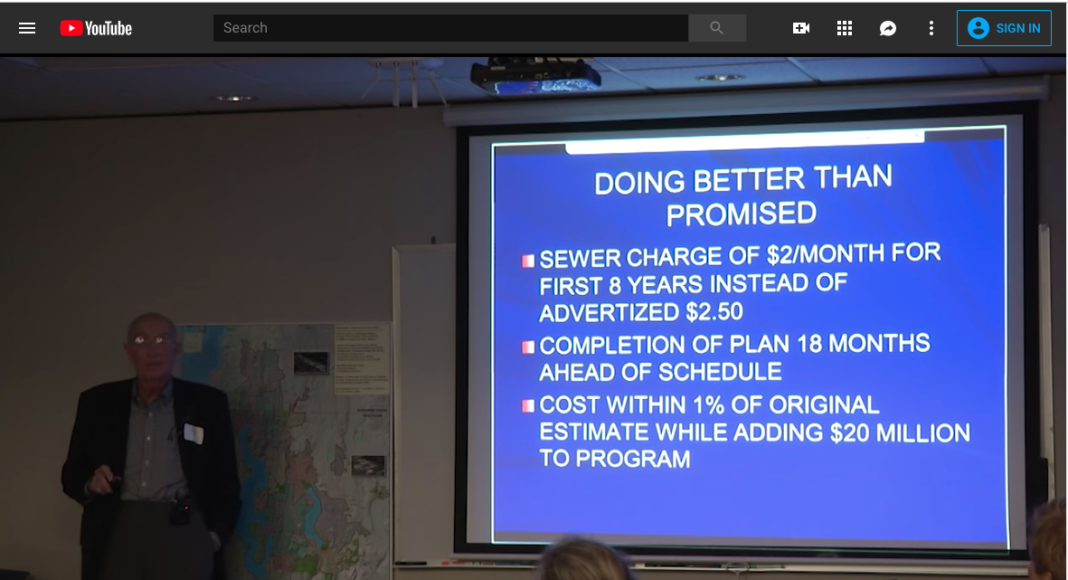
Do we all understand that a community is only as livable today and sustainable tomorrow as the quality of its infrastructure underpinnings? If we do, to find Tom Gibbs’s obituary in the Seattle Times this week is to draw us back to the people – Tom Gibbs was a skilled, tireless, visionary and innovative leader among them – and the time that gave Seattle much of the foundation on which our community thrives today.
In the 1980s and 1990s, I knew Tom and more than a little of his story. Not personally, but by reputation and from far afield in Boston where I worked as Boston came late to charting its own course, largely based on King County Metro’s example, to fix the wastewater pollution crisis fouling Boston Harbor. Tom over the course of his career, well annotated in the Seattle Times obituary, built not just wastewater infrastructure, but ran what is now the Metro bus system and helped build what is now T-Mobile Park. But for me, Gibbs was always first and foremost a titan of environmental wastewater engineering and program delivery whose achievement was the rescue of Lake Washington, the Duwamish River, and Elliott Bay. Maybe it’s because sewer/wastewater careerists don’t see much of the limelight that, within that unlit world, we have no difficulty recognizing our heroes.
When I moved back home to Seattle in 2001, there were more opportunities for first-hand acquaintanceship with Tom, and what a rich privilege that was. There was the man: wise, warm, funny, humble, and an acute observer of the politics and the engineering through which he had led the Metro program that brought us huge and enduring clean water benefits.
How can we today retrieve and hold on to that inspiration as we seem to slog tortuously to meet any of today’s quite fresh and equally daunting regional challenges? Fortunately for us, though Tom now is sadly gone, he left a living memoir in a talk to his retirement community preserved in an obscure but extraordinary 49-minute YouTube video of a brown bag meeting with King County Wastewater Treatment Division staff in 2013:
“They wanted to know about Seattle’s history. And they wanted to know about the clean-up of Lake Washington. They’d heard about it but they didn’t know what it meant. So on that basis I put together this presentation. This is a discussion of what happened in this area in the mid-nineteen fifties. To recognize and document the fact that environmental protection was important to us long before there was a Clean Water Act, long before NEPA or SEPA. There was an environmental ethic this community had, and still has.”
With voter approval secured in 1958, after tortured and hard-bargained fits and starts, for a regional agency to take on the pollution control challenge was secured, Metro went to work:
“The election was in September, ’58. The first meeting was held in October . . . They appointed the first executive director in March of ’59. . . . The engineering consortium . . . was retained in June of ’59. The comprehensive sewer plan was adopted in July of ’59 [laughter heard on the video from the 2013 King County staff audience] . . . And the preparation of the pre-design report and financing plan was authorized in July. So that was moving. And that was the speed at which we tried to finish the whole project, and we did largely.”
No obituary or eulogy could capture the live richness of Tom’s own telling of his and others’ stories. Great tasks were built on pillars he credits: citizen action, environmental ethic, regional cooperation, stellar professionalism, and mission commitment. By today’s standards, unimaginable results of really major projects through politics and engineering, from vision, to plan, to execution to delivery, to results.
But nostalgia for Those-Were-the-Days sells short the lesson to take from Tom’s masterful recounting – to say nothing of some wonderful barbed zingers in the video at still contemporary targets.
Here’s the real lesson. Today we need to hit delete on all the euphonious mission, vision and core values statements and the like that now smother our public agencies. As Tom says, Metro had it right 60 years ago and nothing would be more helpful today than to bring it back – short and sweet:
“Our goal was ‘Do better than promised.’ Our Executive Director made us believe in that and we did. We carried that slogan, mantra if you will, throughout the whole program.”
Discover more from Post Alley
Subscribe to get the latest posts sent to your email.

I am greatly saddened to hear of Tom’s passing. I became acquainted with Tom while I was at the Dept. of Ecology. That was during John Spellman’s administration. My respect for Tom was almost instantaneous. He was such a gentleman and always straight with everything he engaged in. No wonder the Seattle Metro Programs (wastewater and transit) were such high quality organizations and set a foundation to continue today!
in 1984 I came to Seattle Metro as their wastewater system manager and worked with Tom on many projects, eventually, the West Point Treatment Plant design and construction. Fast forward to the 1990’s and I found myself working for CH2MHILL at the request of Tom, who at that time was President of their Water Business Line. Suffice it to say, we came to be very good friends and had family gatherings together and shared the ups and downs of life. Tom was first and foremost a friend and mentor to me while a very trusted business colleague.
My prayers and heart go out to his wife Jean, son Todd, daughter Claudia and all of Tom and Jean’s family. They shared their friendship with me and my wife Terri. Jean was so caring and kind to Terri.